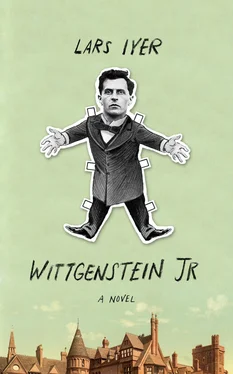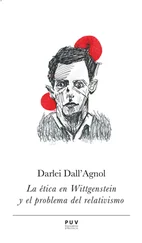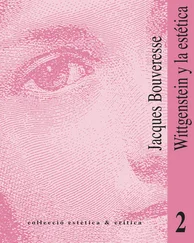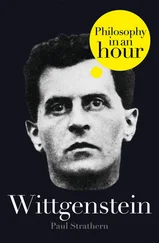And there are thoughts you have to run down , he says — thoughts you have to chase through days and nights. Thoughts which run you down. Thoughts which turn you into the quarry, thoughts which charge you , thoughts which beat you from your hiding place.
And there are thoughts which are cleverer than you are, he says. Wiser than you are. Thoughts which are better than you are, loftier and more noble. High thoughts, thoughts that stream above you …
And there are thoughts of the stratosphere , he says. Of the ionosphere ! Thoughts that skim along the edge of space, and that you have to bring down to earth. Thoughts of the depths — subterranean thoughts, which sing through fundaments and profundities. Reverberant thoughts, like buried earthquakes. Thoughts no longer of the hard crust, but of the blazing mantle. Thoughts of the earth’s core, deep down where lava turns in lava.
Those are the kinds of thoughts he came to Cambridge to think, Wittgenstein says. Those are the thoughts only the atrocious conditions of Cambridge might impel him to think.
He didn’t come to Cambridge to sit at the feet of Collison-Bell, the modal logician, he says. Nor of Hawley, the modal realist. It wasn’t the epistemological work of Pritchett that drew him here, nor the meta-epistemology of McPherson. He didn’t come to study with Oliphant, the famous metaphysician, nor to pursue the meta-philosophy of ‘Mutt’ McDonald. It was not to attend the lectures of Price-Young on Infallibalism , nor of Safranski on Indefeasibility , nor of Subramanian on Externalism , nor of Han on Internalism . It wasn’t to ally himself with the research group on Quantum Cognition , nor to become part of the Computational Neuroscience Network . He had no intention whatsoever of advancing Cambridgean thought in the areas of malleable intelligence , nor of dynacism .
He came to Cambridge to be close to the thieves , he says. Blessed are those who know at what time of night the thieves will come. They will be awake, gathering their strength and strapping on their belts, before the thieves arrive .
It is night, he says. He is strapping on his belt. Because he came to Cambridge to rout the thieves .
(EDE (whispering): Isn’t Wittgenstein, technically, a don?
ME (whispering): But not spiritually . And that’s the point.)
Little St Mary’s Church, damp and quiet. Bottled-up air. The smell of wet plaster.
It’s really only the fragment of a church, you can see that, Wittgenstein says. It was meant to be part of something larger.
He admires the flintwork of the tower. Cambridgeshire flint, he says, the only stone round here. He admires the windows, and the daggers and mouchettes in the tracery. So similar to Ely Cathedral, he says. So unlike other East Anglian churches …
A long pause. The rest of us stand about awkwardly. Wittgenstein smiles. The problem is, none of us really knows what to do in a church, he says.
We know we have to be quiet, he says. We know we mustn’t disturb the church. Even Benwell knows that he shouldn’t make a racket in the calm. But that’s all that remains of the old reverence for the place where heaven and earth were supposed to meet.
WITTGENSTEIN (inspecting the chantry chapels): Christianity declares us to be wretched: that’s its greatness. Christianity knows us as sinners. (A pause.) I suppose you are all atheists.
Titmuss begins to speak of religion in India. No one listens.
MULBERRY: Do you believe in God?
WITTGENSTEIN: I do not. Not, at least, in the sense you think I might.
MULBERRY: Surely you either believe in God or you don’t.
WITTGENSTEIN: Perhaps it is not a question of belief. Perhaps the concept of God is not the kind of thing in which one can believe or disbelieve.
DOYLE: You mean religion is a cultural thing? That it’s all about belonging to a tradition?
Silence.
WITTGENSTEIN: A despairing man cries, O God , and rolls his eyes up to heaven. It is on that basis we should understand both the words God and heaven . A despairing man cries, I am damned , and falls, weeping, to the ground. It is on that basis we should understand both the words damnation and Hell .
The concept of God is used to express an extremity of wretchedness, suffering, and doubt , he says. Really, religion is only for the wretched. That’s why we, who know nothing of wretchedness, know nothing of religion. And that’s why we, who never feel ourselves to be wretched, know nothing of philosophy, either.
A painting of St Michael, weighing souls in his scales. Of St Christopher, crossing a great river with the infant Christ on his shoulder.
Titmuss’s phone goes off (who else would have a Govinda Jaya Jaya ringtone?). He fumbles through his pockets.
Come, let’s go, Wittgenstein says. We shouldn’t wake the church. The church is dreaming. The church is falling through the centuries. The church doesn’t want to be woken up. It doesn’t want us here.
Trumpington Street. A sudden shower. Rain, falling heavily. We shelter in the museum porch, watching the water splash from the gutters.
TITMUSS: It’s like an Indian monsoon. The weather’s gone weird.
EDE: The world’s ending.
MULBERRY: And Cambridge will be the first to go under. Cambridge and Cambridgeshire and East Anglia … The North Sea will reclaim it all.
EDE: You seem pleased.
MULBERRY: Oh, I can’t wait for the world to end!
Rain pours from the mouths of the gargoyles. Chained monkeys … A drowning monk … A faceless figure with a snake in its mouth …
WITTGENSTEIN: Do you know why God sent the Flood? Men spilled their seed on trees and stones. They copulated with beasts. And the greater beasts copulated with lesser beasts — the dog, with the rat; the cock, with the peahen. (A pause.) So God reversed the act of creation, unleashing the sea he had once sealed up, allowing the waters of the deep to sweep over the land.
TITMUSS (quietly): Far out, man.
MULBERRY (quieter still): You’re a fucking hippie, Titmuss.
• • •
Inside the Fitzwilliam, sheltering from the rain.
His brother thought of himself as a kind of Noah , Wittgenstein says, as we wander among the exhibits.
Logic is what guards against the Flood, his brother said. Against the annulment of order. Against the destruction of goodness.
Noah sought a sanctuary on the face of the abyss , his brother wrote in his notebooks. And isn’t that what I am seeking: a sanctuary on the face of the abyss?
As love is stronger than death, so is logic stronger than chaos , his brother wrote in his notebooks. In the storm of the world, the ark of my thought will anchor on the mountain of certainty .
Guy Fawkes’. Midnight, after the pubs close. Mulberry’s annual derangement of the senses house party.
Coats in the front room. DJ in the living room. Dealer in the dining room, showing his wares: MDMA, ‘Miaow Miaow’, and a mystery powder he can’t identify. An amusebouche , he says — a free snort for anyone who buys …
The kitchen. Dozens of cans of beer, wine. A jam-tub full of punch, with floating cherries and slices of banana. Stacks of plastic cups wrapped in cellophane.
The first bedroom upstairs. Very grand, with sanded floorboards and tall sash windows looking out onto the street. The marijuana zone. Posters: Che in his beret, Bob Marley in Rasta colours. We join the smoking circle.
Читать дальше












